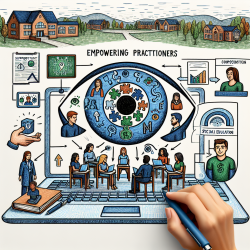The COVID-19 pandemic has brought unprecedented challenges to healthcare systems worldwide, including the field of speech-language pathology (SLP). As highlighted in the research article "Pandemic Planning for Hospital-Based Speech-Language Pathologists: Emerging Lessons from Coronavirus Disease," by Jennifer C. Wong, the need for effective pandemic planning is critical. This blog aims to help practitioners improve their skills by implementing the outcomes of this research and encouraging further exploration.
Understanding the Framework: Stuff, Staff, Space, and Systems
The article utilizes the Stuff, Staff, Space, and Systems framework to guide SLPs in pandemic planning. This framework, originally developed by Christian et al. (2008) and modified by Arya et al. (2020), offers a comprehensive approach to ensure workforce safety and stability.
Stuff: Essential Equipment and Supplies
One of the primary concerns during a pandemic is the availability and management of essential equipment and supplies. SLPs should:
- Identify all necessary equipment and components required for services.
- Determine which items are single-use and which are shared, ensuring proper cleaning protocols are in place.
- Monitor and maintain adequate supplies, considering potential disruptions in the supply chain.
- Collaborate with infection prevention and control teams to stay updated on the latest guidelines for PPE use.
Staff: Maximizing Human Resources
Ensuring the safety and efficiency of the workforce is paramount. SLP leaders should:
- Limit cross-coverage between affected and unaffected areas to reduce transmission risks.
- Advocate for additional staffing when necessary to manage increased caseloads.
- Support staff working outside their usual areas of expertise by providing clinical supervision and technical support.
- Address mental health concerns by offering peer counseling and creating forums for staff to discuss challenges.
Space: Optimizing Physical Environments
Effective use of space is crucial to minimizing transmission risks. SLPs should:
- Conduct assessments and interventions at the bedside or virtually when possible.
- Ensure proper cleaning and ventilation of shared spaces between uses.
- Maintain physical distancing in therapy rooms and administrative spaces.
- Consider using non-traditional spaces, such as boardrooms, to reduce crowding.
Systems: Adapting Processes and Collaborations
SLPs must adapt their processes to meet the demands of a pandemic. Key considerations include:
- Deferring non-essential visits and transitioning to virtual care when possible.
- Implementing objective and transparent screening and triaging practices.
- Collaborating with interprofessional teams to ensure efficient and effective care delivery.
- Maintaining clear communication with decision-makers, especially regarding changes in care practices.
Conclusion
The COVID-19 pandemic has underscored the importance of systematic planning and transparent communication in healthcare. By adopting the Stuff, Staff, Space, and Systems framework, SLPs can better navigate the complexities of pandemic planning and ensure the safety and well-being of both their patients and their teams.
To read the original research paper, please follow this link: Pandemic Planning for Hospital-Based Speech-Language Pathologists: Emerging Lessons from Coronavirus Disease










